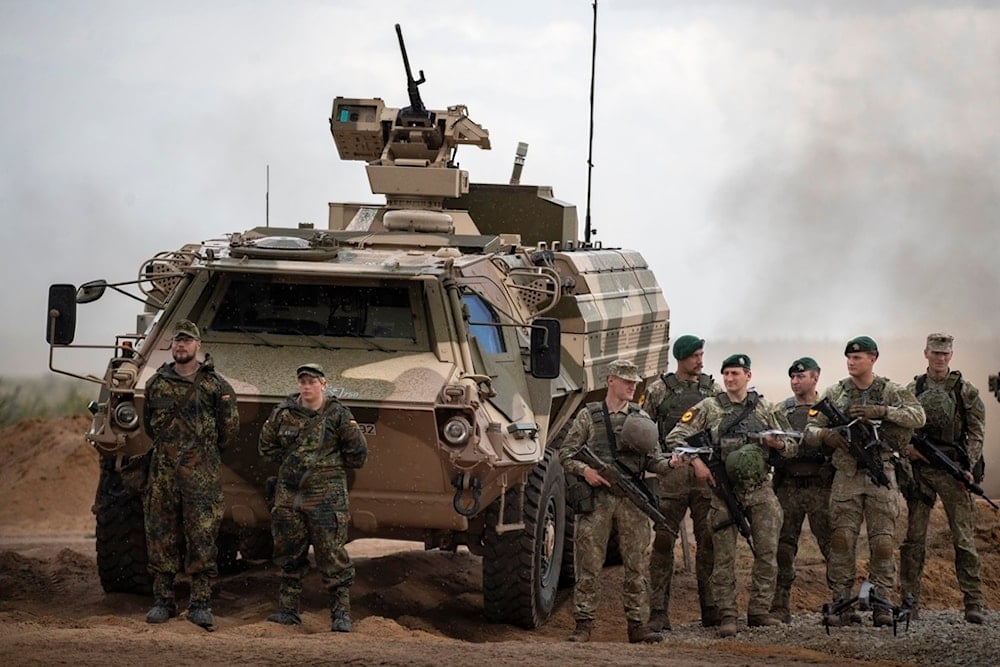Berlin plans to halve Kiev military aid despite possible Trump return
A draft of the 2025 budget seen by Reuters shows that German assistance to Ukraine will be cut to 4 billion euros ($4.35 billion) from around 8 billion euros in 2024.
-

German Bundeswehr soldiers stand next to a German army armored military vehicle during the Lithuanian-German division-level international military exercise 'Grand Quadriga 2024' at a training range in Pabrade, north of the capital Vilnius, Lithuania, on Wednesday, May 29, 2024. (AP)
Germany plans to reduce its military aid to Ukraine by half next year, despite the potential for Republican candidate Donald Trump to return to the White House and halt support for Kiev amid its ongoing war with Moscow.
A draft of the 2025 budget seen by Reuters showed that German assistance to Ukraine will be cut to 4 billion euros ($4.35 billion) from around 8 billion euros in 2024.
Germany expects that Ukraine will manage most of its military requirements with $50 billion in loans from frozen Russian assets, agreed upon by the Group of Seven, and anticipates that not all allocated funds for armaments will be fully utilized, the news agency indicated.
"Ukraine's financing is secured for the foreseeable future thanks to European instruments and the G7 loans," stated German Finance Minister Christian Lindner at a news conference on Wednesday.
The United States urged accelerating the loan disbursement to provide Ukraine with a significant lump sum immediately.
Reuters cited officials as saying that EU leaders agreed to this strategy partly to mitigate the risk of Ukraine facing financial shortages if Trump returns to power.
In Europe, concerns heightened after Trump nominated Senator J.D. Vance, who opposes military aid for Ukraine, as his vice presidential candidate.
Trump's comments drew a strong rebuke from Western officials, who criticized his statements that he might withhold protection from nations failing to meet defense spending targets within NATO and even encourage Russia to attack them.
Meanwhile, Germany has been under scrutiny for its persistent failure to meet NATO's target of allocating 2% of its economic output to defense.
Germany's armed forces, already strained by decades of underinvestment, have seen their stocks further depleted due to arms supplies to Kiev.
To date, Berlin has donated three Patriot air defense units to Kiev, the highest number provided by any country, reducing the number of Patriot systems in Germany to nine.
Germany's coalition government of Social Democrats, liberals, and Greens has struggled to meet NATO's spending target due to self-imposed borrowing limits.
Despite the planned reduction in military aid to Ukraine, Germany will meet the NATO target of spending 2% of its GDP on defense in 2025, amounting to a total of 75.3 billion euros.
Germany can't continue to be involved everywhere in the world: Minister
In a related context, Lindner stressed on Wednesday that Germany must adapt its spending policy to respond to global developments, which also requires adjusting international humanitarian aid expenditures.
"The balance is shifting a bit," the German Finance Minister noted, emphasizing that Germany has significantly more to invest in its "hard security."
"And in reverse, we can't continue to be involved everywhere in the world as we have been up to now, because even Germany's potential as the fourth-largest economy in the world will be limited at some point."
Read more: Reports reveal German MoD’s plans for potential war with Russia

 3 Min Read
3 Min Read











